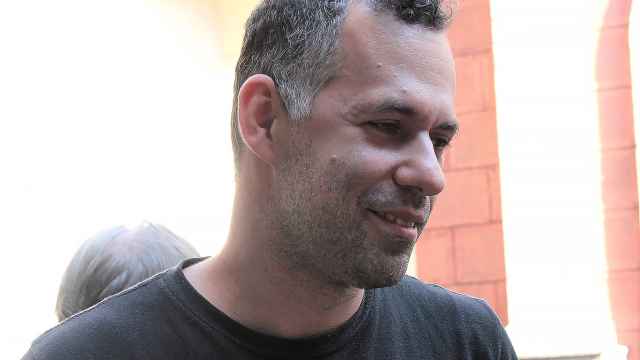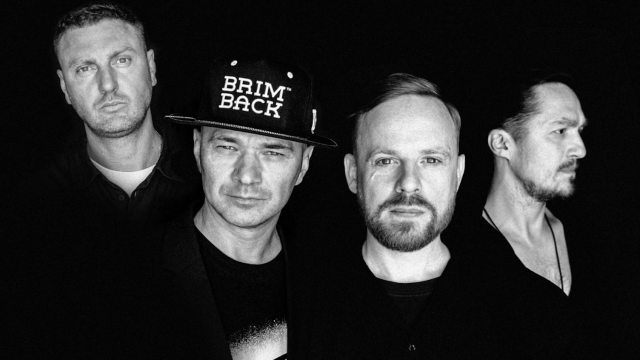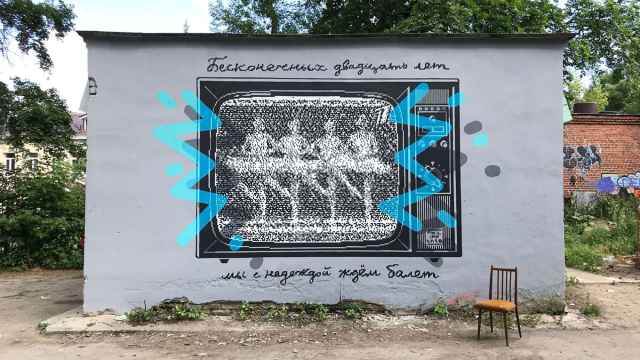The steps were relatively small — from the Moscow Art Theater to Winzavod to Platforma and then a couple of blocks away to what just a few months ago Moscow knew as the Gogol Theater. But as they say about steps, sometimes they lead to giant leaps.
That is what the opening of the Gogol Center is for Kirill Serebrennikov — a giant, a monstrous, a towering leap. I don't want to exaggerate — I don't think we will see him leaping buildings in a single bound any time soon — but there is no other conclusion to draw: The opening of the Gogol Center on Saturday and Sunday was a giant leap not only for one man, but for all of Moscow culture.
The barest bit of background. Not long ago it looked like Serebrennikov was being groomed to take over the Moscow Art Theater, where he teaches and has staged several productions of note. A couple of years ago, however, he ended up overseeing a series of cutting-edge productions that he and his students mounted under the name of Seventh Studio at the Winzavod gallery complex. In the course of the last year he curated theater events — and staged his own impressive version of "A Midsummer Night's Dream" — within the Platforma project, which is housed at Winzavod.
Then came the bomb in August last year. In what appeared to be a last-minute decision by the Moscow cultural authorities, headed by Sergei Kapkov, the longtime artistic director of the Gogol Theater was fired just as he was ready to begin his new season and Serebrennikov was appointed to replace him. They immediately announced that the Gogol Theater would be shut down for restructuring and refashioned as a modern multipurpose cultural complex called Gogol Center.
A hue and cry went up from people on all sides and of all stripes. Actors mounted protests and engaged the participation of politicians to defend them. This was the destruction of the Russian repertory system, they claimed. It was a hostile takeover, others chimed in. It was barbarism, it was chaos, it was fascism — yes, I saw serious people seriously compare the restructuring of the Gogol Theater to fascism.
The new Center's managing director, Alexei Malobrodsky, was physically attacked one night returning home and both Serebrennikov and Kapkov have been said to be the recipients of numerous threats. The arguments and accusations in the press often reached the level of hysteria over the last four months. When Bolshoi Theater artistic director Sergei Filin was doused with acid in mid-January, apparently as fallout from infighting at that famous venue, the situation surrounding the Gogol Center seemed to darken indeed.
And then there was the opening of the Gogol Center last weekend. I attended the first night on Saturday; a second opening was held Sunday to accommodate the huge number of people who wanted to be a part of the rebirthing of the theater.
It was a night of beauty, humor, light, art, theater, dance and music. It was a night for reflection (figuratively and literally — I'll explain). It was a night of creative, talented, interesting people showing what they were capable of – and the team that Serebrennikov put together is capable of a great deal. That was clear even when the events of the first night had not yet concluded.
The Gogol Center will now host four resident companies — Serebrennikov's Seventh Studio, consisting largely of his former students; the Dialogue Dance Company, originally from Kostroma; Vladimir Pankov's SounDrama ensemble; and the so-called Gogol Maly, or Little, Drama Theater, comprising actors from the now-defunct Gogol Theater. Each group performed for approximately 30 minutes in the opening night program, displaying a wide range of interests and styles.
The evening began with a haunting performance that Serebrennikov staged with a dozen actors from the old Gogol Theater. Employing a sensitive text by playwright Lyubov Strizhak, it explored the effects of time on a human's life — love lost, careers mangled, chances missed, offences taken and inflicted, mistakes made. Through it all we watched as individuals' life stories came together in the building blocks of random and planned events.
"How can you expect me to make sense of my life at the same time that I am trying to live it," one person asked.
Next up were Dialogue Dance and the Seventh Studio, both of which created visually arresting and often funny scenes of people attempting with difficulty to come together and find intimacy. The concluding portion of the evening was conducted up by the SounDrama ensemble, which hung their entire sketch on a topic that referenced the controversial build-up to the opening of the Gogol Center and offered their own answer to it.
A group of musicians gathered lazily at one end of a long railroad that protruded from the stage all the way to the back of the hall. Moments later, however, one more figure arrived and warily pulled a hammer out of his guitar case. The others, frightened, pulled hammers out of their instrument cases and a brawl appeared to be imminent. But instead of fighting, the performers began hammering the rails, raising a din of rhythm and music together, segueing back and forth in tight dance rhythms.
We were witness to what happens when the modus operandi is collaboration rather than confrontation.
The old carcass of the Gogol Theater was gutted, reconsidered and redesigned by Vera Martynova, a former student of Dmitry Krymov, who has emerged as one of Moscow's most important designers in the last five years. Her use of the original brick walls, cement buttresses and wood-tiled ceiling in the performance space is nothing less than breathtaking. The space, opened up and stripped back, is now delightfully eclectic, highly theatrical and extremely attractive.
Krymov, on seeing the auditorium for the first time before the doors were opened to the public, said, "That looks like something you'd see in New York, doesn't it?"
A set of thematic, neon-lit mirrors is spread throughout the foyer, lending a sense of hipness and humor to things while reaching back to tap into the depths of theater tradition. The mirrors are cut in the images of great directors past and present and hang on walls next to selected quotes that define their place in history. Among those honored are Anatoly Vasilyev, Konstantin Stanislavsky, Jerzy Grotowski, Vsevelod Meyerhold, Anatoly Efros, Yury Lyubimov and Antonin Artaud. On opening night one could see numerous men and women using the mirrors to correct her lipstick or to check the hang of his coattails.
In addition to the large, transformable main space at the theater, there are small halls, little bandstands and numerous other spaces that will be put to use. There will be musical programs, concerts, film series, a café and a bookstore. The booklet published for the opening lists 15 productions that have already entered the theater's new repertory, some created by Serebrennikov, most created by his colleagues in the new Gogol Center team.
Frankly, I had one word on my lips when I walked out of the Gogol Center Saturday night: "Wow." That still expresses my reactions to this new destination on Moscow's cultural map better than any other word I can think of. A gallery of photos above illustrates why that is.
A Message from The Moscow Times:
Dear readers,
We are facing unprecedented challenges. Russia's Prosecutor General's Office has designated The Moscow Times as an "undesirable" organization, criminalizing our work and putting our staff at risk of prosecution. This follows our earlier unjust labeling as a "foreign agent."
These actions are direct attempts to silence independent journalism in Russia. The authorities claim our work "discredits the decisions of the Russian leadership." We see things differently: we strive to provide accurate, unbiased reporting on Russia.
We, the journalists of The Moscow Times, refuse to be silenced. But to continue our work, we need your help.
Your support, no matter how small, makes a world of difference. If you can, please support us monthly starting from just $2. It's quick to set up, and every contribution makes a significant impact.
By supporting The Moscow Times, you're defending open, independent journalism in the face of repression. Thank you for standing with us.
Remind me later.






